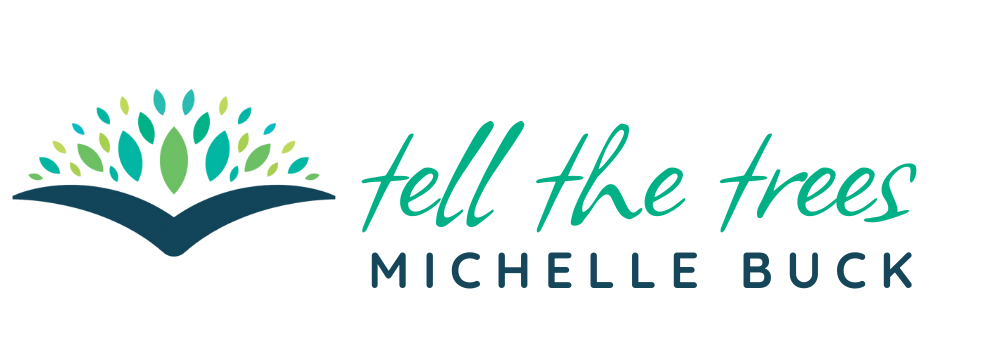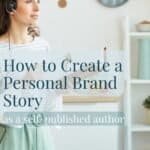by Michelle
Share
by Michelle
Share

Personal branding and a brand story have elements that most stories have: feelings and emotions, a main character, a problem, a solution, and an inspiring ending. It is a combination of values, personal beliefs, goals, and objectives – all of which will impact your audience.
If you need a refresher to personal branding, start here. Then read these posts after:
- 3 Sure Fire Ways to Secure Your Online Presence
- Simple Ways to Define Your Personal Brand for Epic Results
(Note: This article focuses on personal branding, but the term “brand” is used throughout. Although a brand is different than a personal brand, here I’m referring to a person instead of a business or product.)
A brand story is not a resume. You can certainly include jobs you’ve held or positions you’ve had, but it not a list of jobs or a cover letter.
To create a brand story, think of your journey to where you are now.
- Did you leave your comfortable full-time job to pursue your own business?
- Did you experience a rough patch that you took you down a road to an unexpected opportunity?
- Did you launch a big idea only to fail and become disappointed – which led to a distinct path you wouldn’t have thought of before?
Your journey is unique, but everyone has a journey to take. How did you get to where you are now? What hurdles did you encounter? What surprised you the most? How can you tell your story in a way that would resonate with your readers?
The Hero’s Journey
In the Writers Journey by Christopher Vogler, he writes,
“The word hero is Greek, from a root that means ‘to protect and to serve’ (incidentally the motto of the Los Angeles Police Department)…A hero is someone willing to sacrifice his or her needs on behalf of others, like a shepherd who will endure loneliness, discomfort, and danger to protect and serve the flock.”
He also mentions in the book that the hero archetype represents a search for identity and wholeness. While this pertains to characters in a story, it can also be used when writing your own brand story. It is the culmination of learning, growth, action, character flaws, sacrifice, and heroism that makes up your brand story.

Elements of a Brand Story Using the Hero’s Journey
Let’s look at the journey a hero takes which are elements found in Joseph Campbell’s book, The Hero with a Thousand Faces:
- The Departure Act: The Hero Leaves the Ordinary World
- The Initiation Act: The Hero ventures into the unknown and experiences trials and challenges, making him or her a strong champion
- The Return Act: The Hero returns in triumph
For a fun look at how this journey shows up in the movie the Matrix, look at this post by ProWritingAid.
How Other Authors Use a Personal Brand Story
We can incorporate elements of this journey into our brand story, too. But before we do, take about 20-30 minutes and research author websites.
What are they using for their brand story?
Do you see common themes or elements, such as what was mentioned above?
Find a few about pages that you enjoy.
Create Your Brand Story
Once you’ve read through a few examples, create your own brand story. Structure a longer and a shorter version. Use the longer version on your website and the shorter version on social sites, or as a way to introduce yourself in a bio.
Here’s a template you can use to get started, but be sure to expand on anything you think is important to your brand:
I was living a [describe your ordinary life], when suddenly [describe the challenge or call to adventure that disrupted your normal routine].
At first, I [explain your initial reluctance or fear], but with the guidance of [mention a mentor, book, or experience that helped you], I decided to take the leap. This marked the beginning of a transformative journey that would not only change my life but also enable me to [describe how you now help others].
The path wasn’t easy. I faced [describe 1-2 major obstacles or setbacks], which tested my resolve.
But through perseverance and [mention a key skill or quality you developed], I overcame these challenges.
Today, I [describe your current role or mission] with a unique approach that combines [mention 2-3 key elements of your expertise or methodology].
My journey has equipped me with the tools to help [describe your target audience] achieve [mention the transformation or results you offer]. If you’re ready to [call-to-action related to your services], I’m here to guide you on your own heroic journey.

What does your online presence say about you?
Why Should I Create a Personal Brand Story?
Creating a brand story is a great way for others to understand who you are and what you do. Every business has a set of core values, a mission statement, and a brand story that ties it all together. As a personal brand, your story is just as important as any business. Your story helps your readers and audience not only understand who you are and what you do, but it is also a way for them to like and trust you.
Brand Story vs. Personal Brand Story
The difference between a brand story and a personal brand story is that instead of describing the brand (brand story) and focusing on the essence of the brand, you are involving narratives that are taken from your life experiences (personal branding) to convey your values, passions, and unique attributes to showcase your value to an audience.
Your personal brand shows up on social media, your website, and in real life. It is not only who you are, but who you want to be. Personal branding incorporates your values and passions but goes a step further to include the goals and legacy you want to leave behind. In other words, the things you want to stand for when all is said and done.
Authors Need Personal Branding
As an author, this is why building your website and social presence is important. It gives the reader the feeling of having met you in person and results in them feeling as if they know what you are about.
Think of someone you admire and the last time you wanted to learn about them. Maybe you were on social media but decided to click on their website. What was the first thing you explored? Their books? Their bio? All of these things are part of their story. When you build your story, consider these elements too.
Focus on building your personal brand so your audience can see you are human, down to earth, and someone they want to engage with further.
Your audience wants to know your journey. Where will you take them?
Affiliate Disclosure
Tell the Trees is supported by its readers. When you make a purchase using links on this site, it may result in affiliate commission. Please visit my affiliate disclosure page for more information.
Let's Discuss It
Accessibility isn’t just nice to have; in fact, it’s now more important than ever. In 2025, over 1.3 billion people worldwide live with some form of disability, and many use e-readers or screen readers to access digital content. Yet most self-published authors continue to create ebooks that unintentionally exclude these readers. Microsoft Word, a tool
After my post about the European Accessibility Act, I got some fantastic questions from you that made me realize we need to have a more practical conversation especially regarding digital products. My original post focused on what’s been published — either written by lawyers for lawyers or aimed at big publishers with compliance departments. But what
One of the most often missed topics when it comes to writing and your office workspace is productivity. As a writer, you are focused on drafting, editing, book covers, ARC Reviews, and other important self-publishing topics, we forget that there are more efficient ways to do things. In your office or writing space, you might
The biggest threat for authors on Substack isn't competition or algorithm changes. It's something far more basic: the platform itself. Let's learn more.











